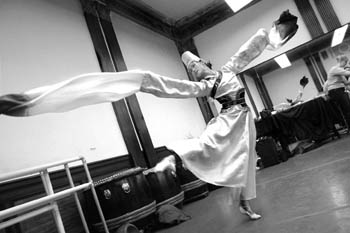![[Metroactive Arts]](/arts/gifs/art468.gif)
[ Arts Index | Silicon Valley | Metroactive Home | Archives ]
Sleeve Art: The costumes become extensions of the dancers in 'Middle Kingdom.'
Going East And West
Ballet San Jose Silicon Valley and Chinese Performing Artists of American meet in 'Middle Kingdom—Ancient China'
By Marianne Messina
PULLING together one grand production from two well-established dance companies trained in different, centuries-old traditions involves years of preparation. Ann Woo, executive director of the Chinese Performing Artists of America (CPAA), has been working on the idea for Middle Kingdom—Ancient China (her company's collaboration with Ballet San Jose Silicon Valley) for five years.
After searching China for a partner, Woo found the answer in her own backyard. As Ballet San Jose's artistic director, Dennis Nahat, tells it, one evening over dinner, Woo "came with an idea and dropped it in the middle of the table like a bomb." The fallout has been years of planning, two trips to China for Nahat (where all the scenery and costumes were constructed) and hundreds of details still in the ironing-out stage.
"The designer himself [Ching Shyu] has not seen his own scenery and all of the costumes yet because we made them in China without him," Nahat explains. The Chinese "specialists in stage design" were working from detailed drawings created by Ching Shyu early in the planning process. Everything had to be shipped from China months before the show, because the costumes required often painstaking alterations. The next thing, Nahat says, was "to bring the staff out to the scenic shop, take the entire production out of the crates and put it together so that everybody knew what everything was—because there are hundreds of pieces."
Middle Kingdom seems graced by that serendipity so typical in a confluence of vibrant, artistic minds. Woo's idea was to tell the legends of "the greatest Chinese inventions"—printing, paper—and composer Phil Young ran with it, completing a basic score with Chinese flavor and Western form in one proverbial brush stroke.
Both Young and choreographer Yong Yau are well versed in East-West fusion. Young had composed Western classical music for the Beijing Symphony before moving to the United States in 1981, "but he also lived in inner Mongolia," says Woo. "He has experience with writing music for a choreographer in China."
Yao trained at the Beijing Dance Academy and achieved the "Best Dancer" title twice before coming to the Bay Area and winning a Gold Award for his Yellow River Suite. "One of the dance pieces that Yao choreographed," for Middle Kingdom, says Woo, "uses ballet technique, Chinese dance technique and martial-arts technique, so it's very special."
The creative team met monthly for an accelerated flow of, as Nahat puts it, "ideas, ideas, ideas, ideas." Even now, when he and Yao discuss the dances, the excitement of discovery passes between them like an electric current. They recall the genesis of the dance that narrates paper's invention, and each choreographer completes the other's story fragments. "Yao got up and showed immediately what he would do," says Nahat, "and I said, �That's the long sleeves.'" (The costume sleeves continue past the hands and look like streamers.) "In China, they used a brush in old times, not a pen," Yao adds. "There! And there!" He demonstrates the movement, a dash of the arm and a sweeping torso twist.
"Not only arms and hands, they used their body," because, as Yao explains, pre-paper writing happened on bamboo. Nahat adds that the music for this scene was already written to a three count—perfect for Yao's movements. "Then we took the beautiful long white costumes and painted them black on the end like a brush," Nahat continues, "so you have this long white sleeve going out, and there's a brush stroke at the end."
The synergy has also poured into the blend of styles and talents among the dancers. Beijing Opera acrobats, classical ballet dancers, classically trained Chinese folk dancers and operatic martial artists come together. And each dance is "fused" smoothly into the next in a rare integration of forms that should make Middle Kingdom a groundbreaking spectacle.
[ Silicon Valley | Metroactive Home | Archives ]
Copyright © Metro Publishing Inc. Metroactive is affiliated with the Boulevards Network.
For more information about the San Jose/Silicon Valley area, visit sanjose.com.
![]()

Photograph by Felipe Buitrago
Middle Kingdom—Ancient China plays Thursday-Saturday at 8pm and Sunday at 1:30pm at San Jose Center for the Performing Arts. Tickets are $22�$68. (408.288.2800)
Send a letter to the editor about this story to letters@metronews.com.
From the February 9-15, 2005 issue of Metro, Silicon Valley's Weekly Newspaper.